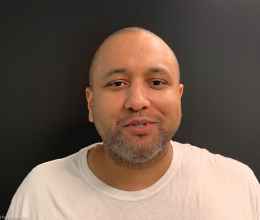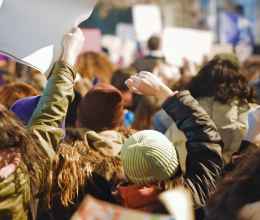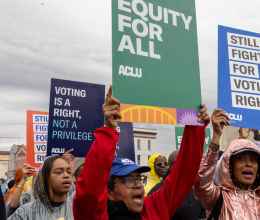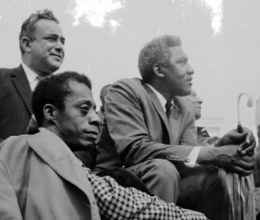
Dear Florida Legislators:
Across Florida, returning citizens continue fighting for our right to vote. After Florida voters passed the Voter Restoration Amendment (Amendment 4) in 2018 with 65 percent of the vote, it automatically restored voting rights to returning citizens who completed their sentences, except those who committed murder or felony sexual offenses. But those with power quickly instituted a poll tax, requiring all returning citizens to pay all outstanding legal financial obligations before regaining the right to vote. Many brave Floridians challenged this poll tax, Senate Bill 7066 (SB7066), in the federal courts, and recently, the Eleventh Circuit Court of Appeals ruled against Florida voters and returning citizens. A majority of the appeals court blessed Florida’s pay-to-vote scheme.
Despite the appeals court’s ruling, those with power must understand SB7066 is part of a larger effort to deny those who have served their sentences their dignity and fundamental rights. After completing our sentences, many returning citizens struggle to find sustainable employment and housing. Although we have served our time, we are often on the receiving end of stigmatization and ostracization by our neighbors and the larger community, which makes it more challenging for us to become contributing members of our communities. Further, many others in government, who claim to champion democracy, continue to propose laws to eliminate returning citizens’ abilities to participate in civic engagement by criminalizing our votes and prohibiting us from becoming full-fledged, productive members of our community. This government action eliminates returning citizens’ abilities to become reintegrated.
Having a real second chance to make positive change and become a contributing member of our communities is met with numerous hurdles and obstacles the day we re-enter society. It harms us, and it harms our families and our loved ones.
Our elected leaders must understand having the ability to vote supports rehabilitation. Acknowledging returning citizens’ humanity and dignity makes our redemption and full rehabilitation possible. An unconstitutional poll tax most of us cannot afford to pay should not destroy our chance at redemption.
Returning citizens’ voices should be heard, and our votes should be counted for our children’s welfare. Please do not silence us and deprive us of the right to preserve our rights and our loved ones’ rights.
The state provides scant resources for returning citizens’ rehabilitation. The lack of meaningful resources for returning citizens who primarily come from low-income communities renders rehabilitation illusory when the government releases us into the same broken communities those in power already see as worthless. This perpetuates a cycle of poverty and disproportionately impacts and discriminates against low-income communities of color. Depriving us our ability to vote makes creating positive change within our communities impossible.
SB7066 makes it nearly impossible for returning citizens to have the second chance in life that the Voter Restoration Amendment promised us and our families. When SB7066 is combined with other suppression policies, our voices are silenced at the ballot box, we are held back from employment opportunities, and resources are withheld from the communities to which we return. Returning citizens are not asking for a handout, but a hand up from the social injustices stifling our futures.
We must also hear and remember the people still in overcrowded jails and prisons who are threatened by or suffering from COVID-19 with little-to-no protections or medical treatments. Their lives and voices also matter.
Please, hear us. We have paid our debts to society and deserve a second chance. Give us a reason to believe our government also cares about us. Twelve-year-old Keedron Bryant recently wrote a song protesting police brutality containing a message we embrace that we also want you to hear: “We just want to live. God, please protect us”.
Tranassa White is a prison reform advocate and resident of Escambia County.




